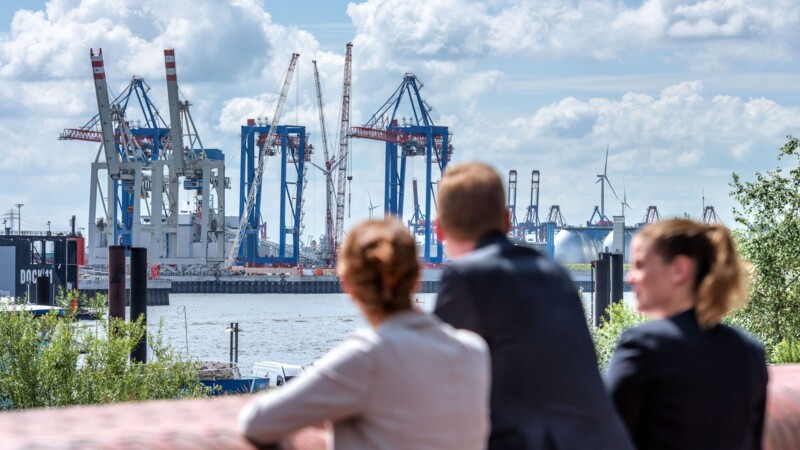The mood in Hamburg’s start-up scene was generally good. Around 79 per cent of companies in Hamburg over 66 per cent across Germany aim to grow turnover significantly from an average of EUR1.3 million in 2019 to EUR 4.4 million. They also want to increase staff considerably and plan above-average expansion on foreign markets. Thorsten Dzulko, Director of PwC in Hamburg, remarked: “I am not surprised by this good mood, as Hamburg has very specific advantages.” Many mid-sized or family-run companies in Hamburg are entrepreneurially-minded and act as business angels – from sparring partners to investors – for start-ups.
Founders in Hamburg are confident about the future and seek to more than triple their turnover and seize foreign markets, according to figures presented Wednesday (March 4, 2020) by PwC and Hamburg Invest. However, founders are having difficulties finding affordable office space, qualified personnel and access to external capital. The findings are based on the regional results of the 7th German Startup Monitor (DSM) and involving 141 Hanseatic companies. Nearly 2,000 respondents took part in the nationwide survey by the Bundesverband Deutsche Startups e. V. (German Start-ups Association) and PwC in co-operation with the University of Duisburg-Essen and published last November. Hamburg counts among Germany’s five start-up hotspots along with Berlin, the Rhine-Ruhr Metropolitan Region, Munich and Stuttgart/Karlsruhe. The presentation was followed by a lively debate on Hamburg as a start-up location chaired by Oliver Rößling (12min.me) and with panellists Florian Nöll, Gunnar Froh (Wunder Mobility), Katrin Pietschmann (Fielmann Ventures), Sanja Stankovic (Hamburg Startups), Veronika Reichboth (Hamburg Invest) and Lilly Wittrock (ChefTreff).
Hamburg entrepreneurs seek to hire
Search for skilled workers and affordable office space
Good personnel are a top priority for founders and four out of five decision-makers in start-ups want to invest in new employees, which is expected to increase by 10 (nationwide: 8) over the next twelve months from 15 to 25. However, finding suitable employees is difficult: “Every third respondent termed access to qualified personnel in Hamburg ‘poor’ due among others to high rents along the Alster and which are doubly problematic for founders. Finding affordable commercial property was also difficult, four out of ten respondents confirmed,” according to Dzulko. “Employees are the bottleneck,” said Gunnar Froh, founder of the Hamburg-based start-up Wunder Mobility. “We usually recruit employees from other countries, but that works quite well.”
Good networks and proximity to universities
Most of Hamburg’s founders (54 per cent) rate Hamburg’s start-up ecosystem as good. However, satisfaction with the location is below the national average of 58 per cent. Founders in Hamburg termed the proximity to universities (78 per cent) and networks to other founders (63 per cent) as good. Slightly under half termed economic policy initiatives as good or very good, which is just under the national average. “Yet, Hamburg is on a very good path here and in my view is committed to promoting start-ups,” said Christoph Haß, contact person for PwC’s start-up initiative NextLevel in Hamburg. “The city has done plenty in recent years to create a flourishing ecosystem for founders and the work of Hamburg Invest’s Startup Unit especially should be highlighted as it presents Hamburg as a very founder-friendly city on both local and international levels.” Founders also benefit from the metropolitan region. Almost two thirds (63 per cent) co-operate with other start-ups, 77 per cent collaborate with established companies (nationwide 67 per cent).

Preferences and reality
Founders in Hamburg have a slight edge when it comes to attracting investors. One third found it easy to convince investors of their financial prognosis compared to 24 per cent across Germany. This might be due to education, said Haß. “More economists work for start-ups in Hamburg than the national average. Perhaps they are a little easier convinced than scientists or engineers of a business plan. Every second person has gained start-up experience and learnt lessons and on raising capital”. Nevertheless, it remains one of the greatest challenges in Hamburg and nationwide. The preferred sources of capital for decision-makers in start-ups are business angels (53 per cent), state subsidies (48 per cent) and venture capital (47 per cent). Around 42 per cent of start-ups in Hamburg are financed by business angels over 23 per cent nationwide. Around 82 per cent of start-ups in Hamburg are financed primarily from their own savings. Venture capitalists are also in short supply on the Alster as everywhere in Germany at only 19 per cent.
sb/kk/pb
Sources and further information
More
Similar articles

Hanseatic start-ups seal deals in latest season of “The Lion’s Den”

IFB offers support module for start-ups
